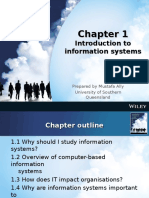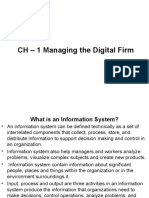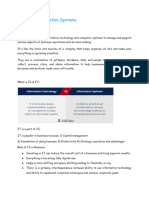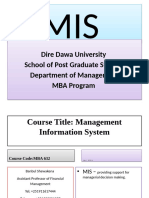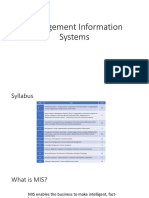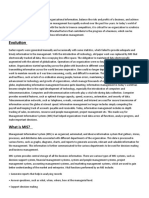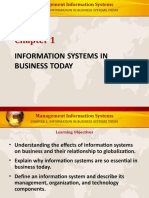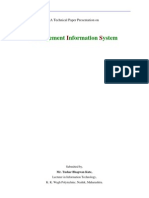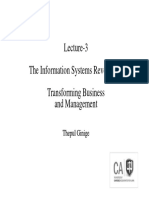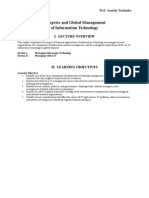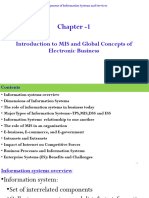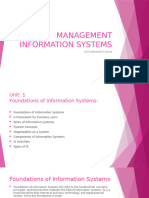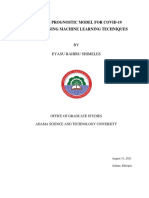0 ratings0% found this document useful (0 votes)
20 viewsISM Presentation 1
ISM Presentation 1
Uploaded by
hawariya abelThis document provides an introduction to an information systems management course. It discusses trends affecting IT management like governance, outsourcing, and the shifting role of IS. The mission of IS organizations has changed from transaction processing to improving enterprise performance through IT use. A simple model and enhanced model of IS in organizations are presented, showing the relationship between technologies, users, delivery, and executive leadership. Finally, a framework for IS management and dichotomy of information work are introduced.
Copyright:
© All Rights Reserved
Available Formats
Download as PPTX, PDF, TXT or read online from Scribd
ISM Presentation 1
ISM Presentation 1
Uploaded by
hawariya abel0 ratings0% found this document useful (0 votes)
20 views11 pagesThis document provides an introduction to an information systems management course. It discusses trends affecting IT management like governance, outsourcing, and the shifting role of IS. The mission of IS organizations has changed from transaction processing to improving enterprise performance through IT use. A simple model and enhanced model of IS in organizations are presented, showing the relationship between technologies, users, delivery, and executive leadership. Finally, a framework for IS management and dichotomy of information work are introduced.
Original Description:
information system management
Copyright
© © All Rights Reserved
Available Formats
PPTX, PDF, TXT or read online from Scribd
Share this document
Did you find this document useful?
Is this content inappropriate?
This document provides an introduction to an information systems management course. It discusses trends affecting IT management like governance, outsourcing, and the shifting role of IS. The mission of IS organizations has changed from transaction processing to improving enterprise performance through IT use. A simple model and enhanced model of IS in organizations are presented, showing the relationship between technologies, users, delivery, and executive leadership. Finally, a framework for IS management and dichotomy of information work are introduced.
Copyright:
© All Rights Reserved
Available Formats
Download as PPTX, PDF, TXT or read online from Scribd
Download as pptx, pdf, or txt
0 ratings0% found this document useful (0 votes)
20 views11 pagesISM Presentation 1
ISM Presentation 1
Uploaded by
hawariya abelThis document provides an introduction to an information systems management course. It discusses trends affecting IT management like governance, outsourcing, and the shifting role of IS. The mission of IS organizations has changed from transaction processing to improving enterprise performance through IT use. A simple model and enhanced model of IS in organizations are presented, showing the relationship between technologies, users, delivery, and executive leadership. Finally, a framework for IS management and dichotomy of information work are introduced.
Copyright:
© All Rights Reserved
Available Formats
Download as PPTX, PDF, TXT or read online from Scribd
Download as pptx, pdf, or txt
You are on page 1of 11
INFORMATION SYSTEMS
MANAGEMENT (MSIT 7103)
Course Instructor: Habtamu Fanta, PhD
School of Informatics
Department of Computer Science
E-mail: habtamu_fanta@yahoo.com
habtamu_fanta@alumni.sjtu.edu.cn
Introduction
• Information System (IS) – combines technology,
people, data and business processes to exploit IT for
organizational performance improvement.
• IS organizations are responsible for managing IT
resources.
• Managing IT resources is getting complicated and
indispensable.
Introduction …
• Major trends that affected IT management:
IT governance – who makes which IT decisions
IS role shift – application oriented system
integration and infrastructure development
Outsourcing vs. insourcing – main responsibility of
IS is managing relationship with external service
providers (ESP)
Introduction …
Introduction …
• Reading assignment (McNurlin, Sprague)
Organizational environment
Technology environment
Mission of IS organizations
• In early days, transaction processing systems
(TPS) served as “paperwork factory” to pay
employees and bill users.
IS is measure on efficiency parametres.
• During MIS era, IS departments focused on
producing reports for all level managers.
IS is measured on effectiveness parametres.
Mission of IS organizations
• Today, the mission of IS organizations has shifted
to:
“To improve the performance and innovativeness of people in
organizations through the use of IT.”
→Improvement of enterprise, not IS.
• IS performance is attributed to business outcome.
• IT is one component contributing to enterprise
performance.
Simple model of IS in organizations
Enhanced model of IS in organizations
• This model provides more guidance in managerial tasks
with four major components:
Technologies that show IT infrastructure are installed and
managed by IS section
Users who use IT for job performance improvement
Delivery scheme for developing, delivering and setting up
apps
Executive leadership to oversee technology usage to
realize organizational objectives
Enhanced model of IS in organizations
Framework for IS management
Enhanced model of IS in organizations
Dichotomy of Information work
You might also like
- Management Information systems - MIS: Business strategy books, #4From EverandManagement Information systems - MIS: Business strategy books, #4No ratings yet
- Lecture 3 - Management Information SystemsDocument24 pagesLecture 3 - Management Information SystemsPraise Nehumambi100% (1)
- Management Information SystemDocument151 pagesManagement Information SystemHarsh RanaNo ratings yet
- Business Technology Chapter 1Document34 pagesBusiness Technology Chapter 1NDNo ratings yet
- Management Information SystemDocument39 pagesManagement Information SystemYt NoobNo ratings yet
- Management Information Systems (MIS) - Increasing Efficiency of HR FunctionDocument17 pagesManagement Information Systems (MIS) - Increasing Efficiency of HR FunctionAlisha OberoiNo ratings yet
- Itrm 2Document34 pagesItrm 2Mujeeb RahmanNo ratings yet
- Management of DataDocument25 pagesManagement of DataSujal ManandharNo ratings yet
- Isys6295 - Mis - W1 - R0Document36 pagesIsys6295 - Mis - W1 - R0Riovaldi SusantoNo ratings yet
- Irm.Document30 pagesIrm.caamitthapaNo ratings yet
- 201 امن Management Information SystemsDocument51 pages201 امن Management Information SystemsTaiseer Al-RatroutNo ratings yet
- MIS-3 Handout PDFDocument3 pagesMIS-3 Handout PDFRaphael Pepiton IslaNo ratings yet
- Management Information Systems: Jane P. Laudon Kenneth C. Laudon Prentice-Hall IncDocument29 pagesManagement Information Systems: Jane P. Laudon Kenneth C. Laudon Prentice-Hall IncAnargya WidyatamaNo ratings yet
- Evolution of IS: Management, Decision-Making and Information Systems That Enhance The Value of InformationDocument28 pagesEvolution of IS: Management, Decision-Making and Information Systems That Enhance The Value of InformationKevin SkillzNo ratings yet
- CH - 1 Managing The Digital FirmDocument22 pagesCH - 1 Managing The Digital FirmAbhijit_Patkar_2711No ratings yet
- Lecture 1 - Introducation To MISDocument28 pagesLecture 1 - Introducation To MISahmed haneefNo ratings yet
- CMIS NotesDocument118 pagesCMIS Noteshalle cNo ratings yet
- Class NotesDocument14 pagesClass NotesPema Sonam YangchenNo ratings yet
- Unit 1 MISDocument13 pagesUnit 1 MISRajat VermaNo ratings yet
- MIS Ch-1Document75 pagesMIS Ch-1mesayhuberNo ratings yet
- Chapter2 Info SystemsDocument28 pagesChapter2 Info SystemsyhfucaNo ratings yet
- Unit 1Document22 pagesUnit 12003vishalkypNo ratings yet
- ITM-22-Aug-2020-02-Information System-1Document21 pagesITM-22-Aug-2020-02-Information System-1Rajkumar RakhraNo ratings yet
- MISupdated PDFDocument69 pagesMISupdated PDFArpana KarnaNo ratings yet
- Introduction To MISDocument15 pagesIntroduction To MISHassam MughalNo ratings yet
- Chapter 1: Information in Business Systems TodayDocument44 pagesChapter 1: Information in Business Systems TodaySara Mae LagrazonNo ratings yet
- Week 1 - Lecture - Introduction To ISMDocument22 pagesWeek 1 - Lecture - Introduction To ISMdgulve143No ratings yet
- Management Information SystemDocument11 pagesManagement Information Systemapi-3728136No ratings yet
- ERP1Document77 pagesERP1Purnima Kapoor0% (1)
- 49049chapter 1 MISDocument36 pages49049chapter 1 MISArif KamalNo ratings yet
- MIS Unit 1Document23 pagesMIS Unit 1Rohit prajapatiNo ratings yet
- ITEC54 - System Integration and Architecture 1 - Overview System IntegrationDocument21 pagesITEC54 - System Integration and Architecture 1 - Overview System IntegrationRsNo ratings yet
- MIS Module 1Document28 pagesMIS Module 1jsji14No ratings yet
- Management Information Systems: Dr. S MeenaDocument29 pagesManagement Information Systems: Dr. S MeenaIndhumathi DNo ratings yet
- Unit 1Document36 pagesUnit 1aryan12524No ratings yet
- Mis & Erp Module - 1Document21 pagesMis & Erp Module - 1papu222No ratings yet
- Lecture-1 - The Information Systems RevolutionDocument18 pagesLecture-1 - The Information Systems Revolutioncory kurdapyaNo ratings yet
- Lecture 2 Need For Information SystemDocument46 pagesLecture 2 Need For Information Systemmaryallaine02No ratings yet
- The Role of Management Information System (MIS) in Organization/DepartmentsDocument32 pagesThe Role of Management Information System (MIS) in Organization/DepartmentsPavi RaviNo ratings yet
- The Evolving Role of IS/IT in Organizations: A Strategic PerspectiveDocument72 pagesThe Evolving Role of IS/IT in Organizations: A Strategic PerspectiveAllesNo ratings yet
- Enterprise and Global Management of Information TechnologyDocument14 pagesEnterprise and Global Management of Information TechnologyArtur99% (69)
- Fundamental Concepts of MISDocument46 pagesFundamental Concepts of MISaromal josephNo ratings yet
- IS Development Business Value of Information Systems and Management KnowledgeDocument45 pagesIS Development Business Value of Information Systems and Management Knowledgeahmadamminudin89No ratings yet
- Topic 1Document47 pagesTopic 1Ju-enBroNo ratings yet
- Unit IDocument21 pagesUnit IRaghavkrishnaNo ratings yet
- Lecture-02 Lecture-02: Information Systems in Global Business Information Systems in Global BusinessDocument19 pagesLecture-02 Lecture-02: Information Systems in Global Business Information Systems in Global BusinessMUSHFIQUR RAHMAN100% (1)
- MIS and Services Chapter 1-Importance of IS ManagementDocument48 pagesMIS and Services Chapter 1-Importance of IS ManagementMuluneh DebebeNo ratings yet
- Ch01-Information Systems - People, Technology, Processes, and StructureDocument52 pagesCh01-Information Systems - People, Technology, Processes, and StructureHiruzen Korupsi Uang NarutoNo ratings yet
- Unit 1 - MisDocument19 pagesUnit 1 - MisG JeevaNo ratings yet
- Management Information System: Syllabus OverviewDocument136 pagesManagement Information System: Syllabus Overviewneemarawat11No ratings yet
- Foundations of Information Systems in BusinessDocument15 pagesFoundations of Information Systems in BusinessBmnCitanduyNo ratings yet
- Information Systems in Global Business TodayDocument38 pagesInformation Systems in Global Business Todayshobhit_garg6No ratings yet
- Introduction To Managing Information & TechnologyDocument6 pagesIntroduction To Managing Information & TechnologyABARRA, ZAIRAH L.No ratings yet
- Course Title: Credit Units: 3 Course Level: UG (BBA-III) Course Code: CSIT204Document15 pagesCourse Title: Credit Units: 3 Course Level: UG (BBA-III) Course Code: CSIT204Vinayak MangotraNo ratings yet
- Introduction To Information SystemsDocument35 pagesIntroduction To Information SystemsJasong100% (1)
- The Information Systems Revolution: Transforming Business and ManagementDocument18 pagesThe Information Systems Revolution: Transforming Business and ManagementNilesh NevarekarNo ratings yet
- Management Information System: Ghulam YasinDocument26 pagesManagement Information System: Ghulam YasinMalik Xain Nawaz KakazaiNo ratings yet
- Managementinformationsystem 121116055905 Phpapp02Document63 pagesManagementinformationsystem 121116055905 Phpapp02Mitali AlugNo ratings yet
- 0594M - PPT1 - R2Document57 pages0594M - PPT1 - R2PaiduSitinjakNo ratings yet
- INT To DiramaDocument21 pagesINT To Diramahawariya abelNo ratings yet
- Operate DB ApplicationDocument64 pagesOperate DB Applicationhawariya abelNo ratings yet
- Short Story BestDocument7 pagesShort Story Besthawariya abelNo ratings yet
- Sidaamu Afiinna Borreessammete Rosaanota Xiinxallote Umma 2013 ArroDocument2 pagesSidaamu Afiinna Borreessammete Rosaanota Xiinxallote Umma 2013 Arrohawariya abelNo ratings yet
- Thesis Review by Hawariya Abel, Year IIDocument11 pagesThesis Review by Hawariya Abel, Year IIhawariya abelNo ratings yet
- 05classification Rule MiningDocument56 pages05classification Rule Mininghawariya abelNo ratings yet
- Temesgen TadesseDocument119 pagesTemesgen Tadessehawariya abelNo ratings yet
- 01 OverviewDocument22 pages01 Overviewhawariya abelNo ratings yet
- 03 PreprocessingDocument42 pages03 Preprocessinghawariya abelNo ratings yet
- Association Rule MiningDocument54 pagesAssociation Rule Mininghawariya abelNo ratings yet
- Training On Digital Electronic AccessingDocument44 pagesTraining On Digital Electronic Accessinghawariya abelNo ratings yet
- 02datawarehousing For DMDocument38 pages02datawarehousing For DMhawariya abelNo ratings yet
- Digital Signature AlgorithmDocument29 pagesDigital Signature Algorithmhawariya abelNo ratings yet
- Building Prognostic Model For Covid-19 Outcome UsingDocument78 pagesBuilding Prognostic Model For Covid-19 Outcome Usinghawariya abelNo ratings yet
- Mis CH-1Document22 pagesMis CH-1hawariya abelNo ratings yet



